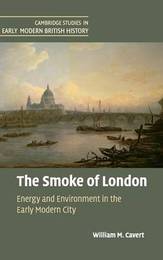
|
The Smoke of London: Energy and Environment in the Early Modern City
Hardback
Main Details
| Title |
The Smoke of London: Energy and Environment in the Early Modern City
|
| Authors and Contributors |
By (author) William M. Cavert
|
| Series | Cambridge Studies in Early Modern British History |
|---|
| Physical Properties |
| Format:Hardback | | Pages:296 | | Dimensions(mm): Height 235,Width 163 |
|
| Category/Genre | British and Irish History
Pollution and threats to the environment |
|---|
| ISBN/Barcode |
9781107073005
|
| Classifications | Dewey:942.106 |
|---|
| Audience | | Professional & Vocational | |
|---|
| Illustrations |
3 Halftones, unspecified; 3 Halftones, black and white
|
|
Publishing Details |
| Publisher |
Cambridge University Press
|
| Imprint |
Cambridge University Press
|
| Publication Date |
7 April 2016 |
| Publication Country |
United Kingdom
|
Description
The Smoke of London uncovers the origins of urban air pollution, two centuries before the industrial revolution. By 1600, London was a fossil-fuelled city, its high-sulfur coal a basic necessity for the poor and a source of cheap energy for its growing manufacturing sector. The resulting smoke was found ugly and dangerous throughout the seventeenth and eighteenth centuries, leading to challenges in court, suppression by the crown, doctors' attempts to understand the nature of good air, increasing suburbanization, and changing representations of urban life in poetry and on the London stage. Neither a celebratory account of proto-environmentalism nor a declensionist narrative of degradation, The Smoke of London recovers the seriousness of pre-modern environmental concerns even as it explains their limits and failures. Ultimately, Londoners learned to live with their dirty air, an accommodation that reframes the modern process of urbanization and industrial pollution, both in Britain and beyond.
Author Biography
William M. Cavert is a historian of early modern Britain focusing on urban and environmental history, holding a Ph.D. from Northwestern University, Illinois. He has published 'The Environmental Policy of Charles I: Coal Smoke and the English Monarchy, 1624-1640' in the Journal of British Studies, as well as related studies in Global Environment and Urban History. His work has been supported by grants from The Mellon Foundation, the Huntington Library, the Horowitz Foundation for Social Policy, Northwestern University, the University of Cambridge, and the University of St Thomas, Minnesota, and by a fellowship at Clare College, Cambridge. His current research examines Britain during the Little Ice Age, focusing on cold winters, disasters, and relationships with animals.
Reviews'The Smoke of London takes its inspiration from environmental history to make a powerful contribution to our understanding of debates in seventeenth- and eighteenth-century England about urbanisation, economic growth, and its environmental consequences ... [The book] does forcibly show that debates about urban pollution long predate the nineteenth century and offers a fascinating window onto environmental attitudes in early modern England. Cavert's book is, then, a wide-ranging, nuanced, and thoughtful contribution to environmental, urban, and English history.' Robert J. Mayhew, Journal of Historical Geography 'The Smoke of London will no doubt find undergraduate as well as specialist readers: it is snappily written, meticulously and helpfully footnoted and tackles historiographical debates in a range of fields with admirable clarity. A memorable anecdote frames each chapter, and gives a window into the breadth of research that sits behind the book's key arguments. Sensitive readings of literary sources are placed in a robust economic framework. Carefully explained statistics sit alongside weird and wonderful cases from the royal courts, in a potent blend of political, scientific, economic, industrial and social history, all under the 'environmental' umbrella. It is a brilliant book that deserves to be widely read.' Andy Burn, Urban History 'An erudite study of the environmental price paid by the growth of early modern London, which looks to be repeated in present-day Beijing.' Gillian Tindall, History Today 'William Cavert has written an engrossing, readable, and authoritative study of a significant episode in the history of the urban environment, one with important lessons for today.' Christine L. Corton, Renaissance Quarterly 'Until recently, environmental history has remained something of a curiosity in early modern British history. With The Smoke of London, Cavert has done both fields a great service in showing the importance of each to the other. This is a book that should be read by anyone interested in urban, environmental, British, or early modern history.' John Emrys Morgan, Canadian Journal of History
|